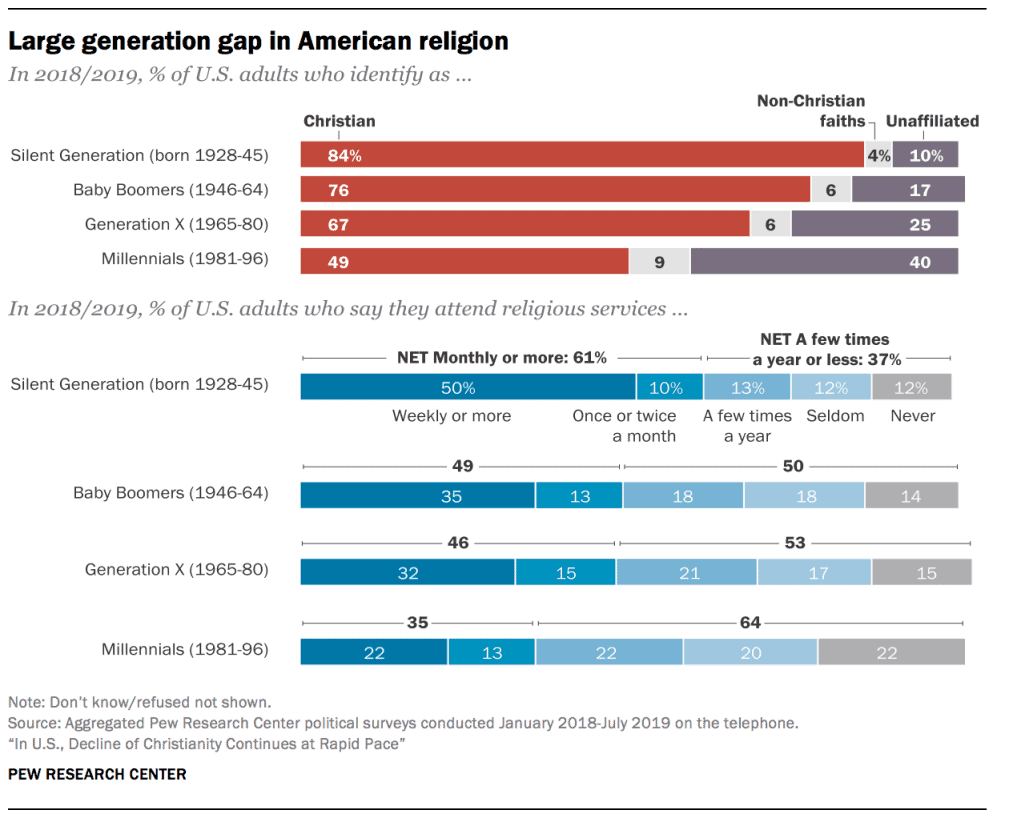
Navigating the Faith Generation Gap
October 31, 2019
I had to teach my son how to hold the phone up to his ear in order to hear and talk into it. He knew how to face time and skype, but putting a phone up to his ear was archaic for his generation. I found it amusing, but there is another type of generation gap that has more serious consequences.
Christianity is declining rapidly according to the latest PEW Research Center survey. This graph details how each generation, from the Silent Generation to Millennials is shifting towards non Christian or unaffiliated.

What this means is that among all the various things that divide generation from generation, there is now a significant FAITH generation gap, where kids and parents and grandparents are not identifying with the same faith, making parenting harder than ever.
Make no mistake, this is a NEW problem. Generations in the past could rely on raising their children with a certainty of faith proposition but now parents flounder when it comes to passing on their faith. The habits of our peers are changing, faith communities are shutting down, numerous alternative activities vie for our attention on Sunday mornings.
But the numbers do not paint an adequate picture of the storms raging in our souls as parents ride waves of doubt, confusion, & spiritual trauma while pretending we are meant to be an anchor for our children.
Whereas in the past, you could solicit your parents (the children’s grandparents)’ help to reinforce the values you want to instill in the next generation, now many parents find themselves playing gatekeeper to make sure the children aren’t being exposed to the unpalatable views of grandparents.
So you draw boundaries but then you worry that your children are too isolated from extended family support and missing out on the richness of a village.
Speaking of the village, churches used to be a structure of significant support for raising families—trading babysitting hours, celebrating holidays together in communion, hosting small group with a few families, regularly building camaradarie and memories together.
What happens to family life when Millennials are down to only 22% who attend religious services weekly? Connection is built with regular and repeated common experiences. No church very often means no friends. Which means parents are on their own, doing one of the hardest jobs in isolation.
I’m not here to fear-monger, or to pearl clutch getting people to go back to church. But I think we should take the implications of the faith generation gap seriously for the well-being of our families.
Families need stability, support, and channels to cultivate a rich spiritual life—all of which are at risk because of the significant rift of the faith generation gap.
It’s tempting to want to go back to the “good ol’ days,” but I think we have to be careful not to glorify the past. The stability and certainty of past family support systems provided by faith institutions were often rife with patriarchy and abuse of all sorts. There’s good reason people are no longer committing their allegiance to faith communities.
Instead, we should take the data of new trends and let it inform our path forward.
How can we help strengthen bonds between generations given this faith generation gap?
How do we heal the spiritual wounds of parents managing the faith from which they were raised so they can cultivate the faith environment for their children?
It used to be people found their moral center within religion, and when ethical quandries came up, parents sought the counsel of religious leaders. After a litany of abuse allegations of religious leaders across all denominations and faiths, that advice feels less authoritative. Parents still need guidance because most of us spend our lives knee deep in dishes and diapers, at least some of the spiritual direction needs to be outsourced. How? When? Where?
I’ve spent the past several years asking these questions and I think the answers, as they are often are, reside deep within ourselves.
As Glennon Doyle likes to say, “We are the ones we’re waiting for.”
We are the ones who can learn how to draw adequate boundaries and refuse to capitulate our true selves any longer.
We are the ones who can do the work to heal our spiritual wounds and break toxic cycles for our children.
We are the ones who can decide for ourselves and our families how to curate our communities for spirituality—be it church or hiking club or the local political campaign.
The instability of the faith generation gap can become a disruption for good. It can lead us into raising children with greater self-autonomy. It can compel us to construct more robust boundaries SO THAT we can build more meaningful relationships. And declining church attendance and allegiance to Christianity does not mean we have to give up cultivating rich spiritual environments for our families.
Together we can forge new paths and refresh our gatherings infused with meaning that’s relevant to the needs of those falling through the cracks of the faith generation gap.
I echo writer Rooney Wynn in declaring, “I believe in community, social justice, art; in creating; in goodness, protest, kindness; in relationship, refuge, solace, story. In promise, in renewal, in “all things new.”
Parents will be the first to tell you it’s hard to give birth, but we will also hold witness that it’s worth it.
Do you feel like you’re being tossed to and fro by changing cultural conversations and your own faith deconstruction? Download this training to help you find values to guide your family life.